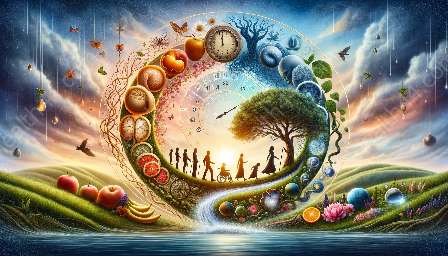As men age, they may experience a natural physiological transition known as andropause, often referred to as male menopause. This topic cluster aims to provide a comprehensive understanding of andropause, its impact on reproductive health in relation to aging, and reproductive health in general. With a focus on andropause, we'll explore the symptoms, causes, treatments, and implications of this unique phase of a man's life.
What is Andropause (Male Menopause)?
Andropause, sometimes colloquially referred to as male menopause, is a transitional phase in a man's life that involves a decline in testosterone levels and a range of associated symptoms. While not as abrupt or clearly defined as menopause in women, andropause represents a significant shift in hormone levels and can affect a man's overall well-being, including his reproductive health.
Reproductive Health in Relation to Aging
As men age, their reproductive health undergoes changes due to hormonal shifts and aging-related physiological alterations. It is important to understand the impact of andropause on male reproductive health, including potential challenges and the need for adapted healthcare strategies to support men through this stage of life.
Recognizing the Symptoms of Andropause
Many men may experience symptoms associated with andropause, which can manifest in various ways. These symptoms may include fatigue, decreased libido, erectile dysfunction, mood changes, and decreased muscle mass. Understanding these signs is crucial in identifying andropause and seeking appropriate support and treatments.
Causes of Andropause
The primary cause of andropause is the natural decline in testosterone production that occurs with aging. This decline is a normal physiological process, but it can lead to a range of symptoms that impact a man's reproductive health and overall well-being. Additionally, lifestyle factors, such as diet, exercise, and stress, can also play a role in the onset and severity of andropause symptoms.
Impact on Reproductive Health
Andropause can significantly impact a man's reproductive health, leading to changes in sexual function, fertility, and overall well-being. Understanding the effects of andropause on reproductive health is essential in developing comprehensive strategies for managing and supporting men through this transitional phase of life.
Treatments and Management
There are various treatment options and management strategies available to address the symptoms of andropause and support reproductive health in aging men. This may include hormone replacement therapy, lifestyle modifications, nutritional interventions, and psychological support to manage the emotional and mental aspects of andropause.
Reproductive Health Considerations
Reproductive health encompasses a broad range of factors related to the male reproductive system, including hormonal balance, sexual function, fertility, and overall well-being. Understanding how andropause intersects with reproductive health is crucial in providing holistic care and support for men as they navigate this phase of life.
Conclusion
Andropause is a natural and unique phase in a man's life that can affect reproductive health in the context of aging. By recognizing the symptoms, understanding the causes, and exploring treatment options, men and healthcare professionals can develop a proactive approach to managing the impact of andropause on reproductive health. With a comprehensive understanding of andropause and its implications, individuals can approach this phase of life with informed awareness and resilience.


